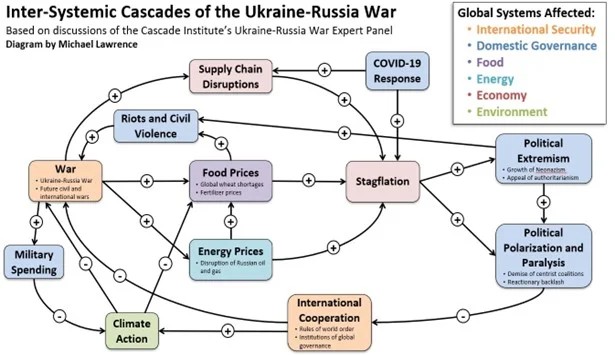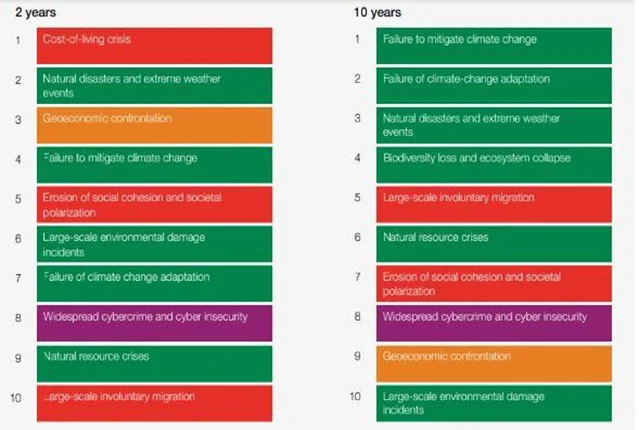Economics, Governance
Context: The World Economic Forum in its ‘Global Risks Report 2023’ warned that the world could see a poly crisis emerging from the Russia-Ukraine war.
About Polycrisis:

- The term poly crisis was first used in the 1990s by French theorist of complexity Edgar Morin.
- When multiple crises in multiple global systems become causally entangled in ways that significantly degrade humanity’s prospects.
- These interacting crises produce harms greater than the sum of those the crises would produce in isolation, were their host systems not so deeply interconnected.
- The ‘Polycrisis’ was first used by former European Commission president Jean-Claude Juncker to describe Europe’s combustible situation in 2016 which combined indebtedness with Brexit, climate change and a refugee crisis.
World Economic Forum on Polycrisis and its Impacts:
- The report has mentioned that the world is facing a set of risks that feel both wholly new and eerily familiar.
- There are older and familiar risks which are getting entangled with the new and emerging risks which collectively can lead to a Polycrisis.
- Older risks: These include inflation, cost-of-living crisis, trade wars, capital outflows from emerging markets, widespread social unrest, geopolitical confrontation and the spectre of nuclear warfare.
- New developments: These include unsustainable levels of debt, a new era of low growth, low global investment and de-globalisation, a decline in human development, and the growing pressure of climate change.
According to the report, these global risks classified into short term and the long term risks:

- Short term risks: These include the rising cost of living, slow economic growth, and tight global food and energy supplies.
- Long term risks: These are failure to mitigate climate change, failure to adapt to climate change, extreme weather events, and the threat of biodiversity collapse.
- The report further goes on to state that these risks may converge into a Polycrisis by the end of the decade.
Reasons for the risks as mentioned in the report:
- Recent Events: The war in Ukraine sent energy and food prices soaring. The resulting inflationary pressures ignited a global cost-of-living crisis which has led to social unrest.
- Persistent events: Demand for food, water and energy are rising as a result of population growth and socioeconomic advancement.
- The expansion of renewable energy systems is creating an unprecedented demand for rare minerals and metals.
- Reverberating impacts of the COVID-19 pandemic to global wars and conflict, from high inflation and sluggish economic growth to increasingly extreme climate events, the world is facing a remarkably diverse range of crises all at the same time.
- On top of all that, carbon emissions continued to rise as economies reopened after the pandemic.
- The gap between demand and supply of these resources could have catastrophic consequences, including biodiversity loss, ecosystem collapse, trade wars and armed conflict between nations.
- The report describes four potential futures centred around food, water and metals and mineral shortages, all of which could spark a humanitarian as well as an ecological crisis – from water wars and famines to continued overexploitation of ecological resources and a slowdown in climate mitigation and adaptation.
Recommendations made by the Report against Polycrisis: A Way Forward
- Given uncertain relationships between global risks, similar foresight exercises can help anticipate potential connections, directing preparedness measures towards minimizing the scale and scope of Polycrisis before they arise.
- In such a situation, many governments have refocused their priorities towards short-term risks such as countering food shortages or energy shortfalls at the cost of ignoring climate change and global development when they are most needed.
- It asks world leaders to address the issue of erosion of trust. “Addressing the erosion of trust in multilateral processes will enhance our collective ability to prevent and respond to emerging cross-border crises and strengthen the guardrails we have in place to address well-established risks,”.
- It further calls on leaders to act collectively, decisively and with a long-term lens to shape a pathway to a more positive, inclusive and stable world.
Source: World Economic Forum











